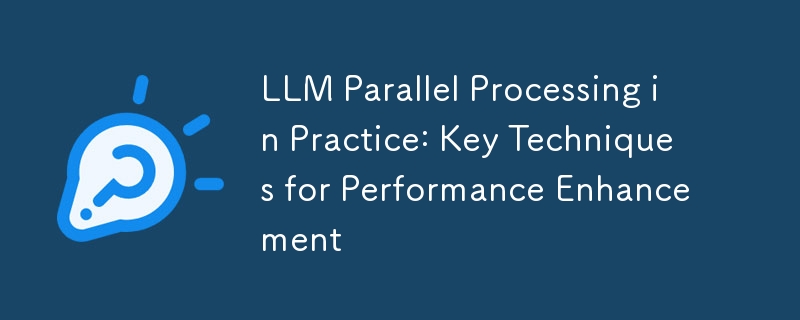

In LLM-Anwendungen eignet sich die Parallelverarbeitung besonders für:
from typing import List, Dict, Any
from dataclasses import dataclass
import asyncio
from langchain.chat_models import ChatOpenAI
from langchain.callbacks import AsyncCallbackHandler
@dataclass
class BatchConfig:
"""Batch processing configuration"""
batch_size: int = 5
max_concurrent_tasks: int = 3
timeout_seconds: int = 30
retry_attempts: int = 2
class BatchProcessor:
def __init__(self, config: BatchConfig):
self.config = config
self.llm = ChatOpenAI(
temperature=0,
request_timeout=config.timeout_seconds
)
self.semaphore = asyncio.Semaphore(
config.max_concurrent_tasks
)
async def process_batch(
self,
items: List[Any]
) -> List[Dict]:
"""Main batch processing function"""
batches = self._create_batches(items)
results = []
for batch in batches:
batch_results = await self._process_batch_with_semaphore(
batch
)
results.extend(batch_results)
return results
class AsyncBatchProcessor(BatchProcessor):
async def _process_single_item(
self,
item: Any
) -> Dict:
"""Process single item"""
async with self.semaphore:
for attempt in range(self.config.retry_attempts):
try:
return await self._execute_processing(item)
except Exception as e:
if attempt == self.config.retry_attempts - 1:
return self._create_error_response(item, e)
await asyncio.sleep(2 ** attempt)
async def _execute_processing(
self,
item: Any
) -> Dict:
"""Execute specific processing logic"""
task = asyncio.create_task(
self.llm.agenerate([item])
)
try:
result = await asyncio.wait_for(
task,
timeout=self.config.timeout_seconds
)
return {
"status": "success",
"input": item,
"result": result
}
except asyncio.TimeoutError:
task.cancel()
raise
class DocumentBatchProcessor:
def __init__(self):
self.config = BatchConfig(
batch_size=10,
max_concurrent_tasks=5
)
self.processor = AsyncBatchProcessor(self.config)
self.results_manager = ResultsManager()
async def process_documents(
self,
documents: List[str]
) -> Dict:
"""Process document batches"""
try:
preprocessed = await self._preprocess_documents(
documents
)
results = await self.processor.process_batch(
preprocessed
)
return await self.results_manager.merge_results(
results
)
except Exception as e:
return self._handle_batch_error(e, documents)
class ResourceController:
def __init__(self):
self.token_limit = 4096
self.request_limit = 100
self._request_count = 0
self._token_count = 0
self._reset_time = None
async def check_limits(self) -> bool:
"""Check resource limits"""
await self._update_counters()
return (
self._request_count < self.request_limit and
self._token_count < self.token_limit
)
async def track_usage(
self,
tokens_used: int
):
"""Track resource usage"""
self._token_count += tokens_used
self._request_count += 1
async def wait_if_needed(self):
"""Wait for resource release if necessary"""
if not await self.check_limits():
wait_time = self._calculate_wait_time()
await asyncio.sleep(wait_time)
class ResultsManager:
def __init__(self):
self.merge_strategies = {
"text": self._merge_text_results,
"embeddings": self._merge_embedding_results,
"classifications": self._merge_classification_results
}
async def merge_results(
self,
results: List[Dict]
) -> Dict:
"""Merge processing results"""
merged = {
"success_count": 0,
"error_count": 0,
"results": []
}
for result in results:
if result["status"] == "success":
merged["success_count"] += 1
merged["results"].append(
await self._process_result(result)
)
else:
merged["error_count"] += 1
return merged
class MemoryManager:
def __init__(self, max_memory_mb: int = 1024):
self.max_memory = max_memory_mb * 1024 * 1024
self.current_usage = 0
async def monitor_memory(self):
"""Monitor memory usage"""
import psutil
process = psutil.Process()
memory_info = process.memory_info()
if memory_info.rss > self.max_memory:
await self._trigger_memory_cleanup()
async def _trigger_memory_cleanup(self):
"""Trigger memory cleanup"""
import gc
gc.collect()
class PerformanceMonitor:
def __init__(self):
self.metrics = {
"processing_times": [],
"error_rates": [],
"throughput": []
}
async def record_metrics(
self,
batch_size: int,
duration: float,
errors: int
):
"""Record performance metrics"""
self.metrics["processing_times"].append(duration)
self.metrics["error_rates"].append(errors / batch_size)
self.metrics["throughput"].append(
batch_size / duration
)
Stapelverarbeitungsoptimierung
Parallelitätskontrolle
Fehlerbehandlung
Systemebene
Anwendungsebene
Parallele Verarbeitung ist für die Erstellung leistungsstarker LLM-Anwendungen von entscheidender Bedeutung. Wichtige Erkenntnisse:
Das obige ist der detaillierte Inhalt vonLLM-Parallelverarbeitung in der Praxis: Schlüsseltechniken zur Leistungssteigerung. Für weitere Informationen folgen Sie bitte anderen verwandten Artikeln auf der PHP chinesischen Website!




